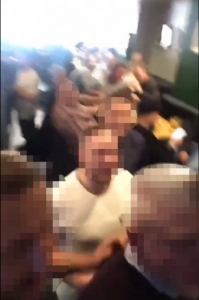- Jan 11, 2013
- 18,115
- 11,770
Soccer is in Denial About its Racism Problem

https://sports.yahoo.com/soccer-denial-racism-problem-150316609.html
thoughts?
https://sports.yahoo.com/soccer-denial-racism-problem-150316609.html
Michy Batshuayi couldn’t contain his ire.
UEFA, European soccer’s governing body, had set out to investigate the monkey noises the Belgian Borussia Dortmund striker said he heard in an away game at Italian club Atalanta last month. And then it dropped its investigation into racist or discriminatory behavior on Thursday, without explanation.
Batshuayi didn’t hold back in showing his dismay in a pair of tweets.
It’s tough to say if Batshuayi really was racially abused. It’s also unlikely that he’d call that kind of attention to himself for no good reason. He deserves the benefit of the doubt. Because such an incident would hardly stand alone.
If you look for it, it’s everywhere.
Stories of the rampant racism in soccer, pulled from the earth in one place, only to pop up elsewhere, are constant.
Less than three months before the World Cup will kick off in their country, Russian fans made monkey noises at France stars Paul Pogba and Ousmane Dembele during their friendly on Tuesday. That’s doubly alarming because there’s widespread concern that racism will pervade soccer’s signature event this summer.
Russia has denied that racism is even a thing in its soccer stadiums and promises that the World Cup will be free of it. Russia manager Stanislav Cherchesov has arguedthat racism in Russian soccer isn’t a big enough issue to merit fighting it.
Russian giants Zenit St. Petersburg, a club with a long history of racist crowd behavior, faces UEFA discipline for the way its fans racially taunted an injured RB Leipzig player during a recent game. In December, Zenit was finedafter its fans unfurled a banner glorifying Ratko Mladic, a Serbian army officer responsible for the slaughter of 8,000 Muslim men and boys during the genocide in Bosnia.
But the problem is hardly Russian alone.
Laureled French club Olympique Lyon faces the daunting prospect of a year-long expulsion from UEFA’s continental competition for recent “racist behavior” by its fans. Long-time Chelsea coach Gwyn Williams has been accused of persistent “racist bullying” by at least four former Chelsea youth players. Batshuayi heard monkey chants from Atalanta fans earlier this month, and was then taunted on Twitter with monkey and banana emojis.
Dig deeper. Look harder. There’s more of this stuff. Much more. These are just the recent incidents. Soccer has an almost institutional racism problem.
Yet FIFA closed down its anti-racism taskforce in the fall of 2016, claiming that there was no racism left to fight. Because FIFA.
Sports have been a driver and accelerator of social causes, especially stateside. But sometimes they lag behind our larger culture and the evolution of our behavioral standards and mores. Soccer seems to be a haven for the bigoted, rather than a proactive factor of ridding ourselves of this baseless hatred.
Racism has always been an issue in soccer. Always. The sport was slow to integrate, and only recently have we come to appreciate just how much a soft, unspoken — or, in a recent French Football Federation scandal, spoken — racism precluded minority players from national team opportunities. And there’s an argument to be made that managers still pigeonhole black players into certain positions and roles.
Even the sport’s nomenclature buries its bias only barely below the surface. Black strikers are mostly described as “powerful” while white playmakers tend to be “technical.” It’s very rarely the other way around. In 2018, there still aren’t a whole lot of black playmakers at the highest level, akin to the preference for white quarterbacks that long prevailed in the NFL.
But, if anything, the sport’s reaction to these racist behaviors — both overt and subliminal, and both aggressive and possibly subconscious — is brief outrage. Disciplinary action from UEFA or the other governing bodies tends to be limited to a fine or a mere wrist-slap like probation or a warning. That’s what makes the possible Lyon ban significant, it would actually constitute a real penalty.
Such assertive punishments are depressingly rare, though. Soccer isn’t dealing with its racism problem largely because it rarely acknowledges that it has a racism problem. Former FIFA President Sepp Blatter once suggested seriously, and on the record, that if one player had racially abused another, they should simply shake hands following the game. Problem solved.
It’s hard to deal with an issue if you don’t recognize it or indeed acknowledge its scope. Many in soccer don’t seem to think that it has a problem at all. Which leaves its victims with no better recourse than to get angry on Twitter.
thoughts?











